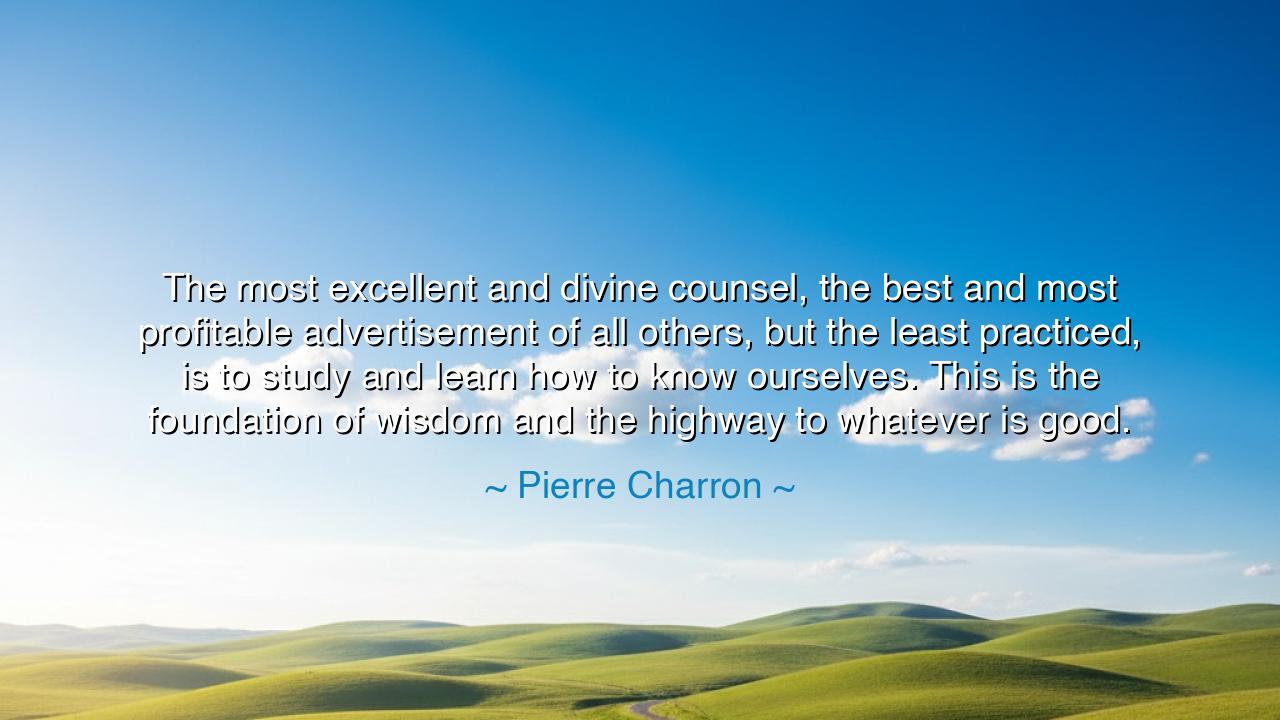
The most excellent and divine counsel, the best and most
The most excellent and divine counsel, the best and most profitable advertisement of all others, but the least practiced, is to study and learn how to know ourselves. This is the foundation of wisdom and the highway to whatever is good.






Pierre Charron, the French moral philosopher, gives us this solemn teaching: “The most excellent and divine counsel… is to study and learn how to know ourselves.” In these words lies the echo of the Delphic oracle—“Know thyself”—which guided sages and kings alike. Charron laments that though this counsel is the foundation of wisdom and the highway to whatever is good, it is the least practiced, for men are swift to judge the world but slow to turn their gaze inward.
The meaning is piercing. To know ourselves is to confront our weaknesses, to understand our passions, to discern what is fleeting and what is eternal within us. Without this knowledge, wisdom cannot stand, for the man who does not know himself stumbles blind through life, mistaking pride for strength, desire for truth, and illusion for reality. But the one who studies his own soul lays the groundwork for virtue, for he becomes master of himself rather than slave of his impulses.
Consider the life of Socrates, who wandered the streets of Athens questioning citizens, not to humiliate them, but to awaken them to their own ignorance. His greatness was not in teaching doctrines but in guiding others to the recognition of themselves. He declared that the unexamined life is not worth living. Though condemned by the city, his counsel endures because it was born of this same truth that Charron proclaims: self-knowledge is the doorway to the good.
Yet this path is hard, and therefore rare. It demands humility to see our own errors, courage to face our inner shadows, and perseverance to correct what is disordered. Many prefer the easier road of distraction, of outward pursuits, of chasing wealth and glory. But these crumble when tested. Only the one who knows himself stands firm, for he has built his life upon the unshakable stone of truth.
Therefore, O seeker, heed this divine counsel. Turn inward before you turn outward; examine your heart before you judge the world. For the soul that knows itself is a kingdom greater than empires, and the wisdom gained therein is a treasure more enduring than gold. To walk this path is to walk the highway to the good, where every step leads not to vanity but to virtue, not to delusion but to the eternal.






VAPham Viet Anh
I love how this statement connects morality, wisdom, and self-awareness. It implies that ethical living isn’t about rigid rules but about understanding one’s true nature. Still, I question whether knowing ourselves automatically leads to goodness. History is full of people who understood their flaws but embraced them anyway. Perhaps Charron meant that awareness gives us the *opportunity* for virtue, not the guarantee. Does self-knowledge always inspire improvement, or can it also justify weakness?
Dduongtoet
What stands out to me here is the contrast between how valuable and how rare this practice is. Everyone claims to value wisdom, but few dedicate time to self-reflection. Maybe Charron’s point is that the path to goodness isn’t through external teachings, but inward study. It makes me wonder how this idea fits in today’s world, where self-knowledge is often replaced by self-presentation. Are we more interested in appearing wise than becoming so?
TNThi Trang Nguyen
Reading this makes me think about how difficult it is to truly know oneself in a world full of distractions. We often define ourselves by what others see or expect, rather than what we actually are. Charron’s words feel like a warning that without inner clarity, our actions risk being misguided. But can anyone ever fully know themselves? Or is self-knowledge a lifelong process, more journey than destination, constantly refined through experience?
GTGia Trang
I find this idea profound and a bit humbling. It suggests that all wisdom begins with understanding one’s own nature, limitations, and motives. But if self-knowledge is so essential, why do most people neglect it? Maybe because it lacks tangible rewards compared to external success. Still, Charron seems to imply that every good thing—ethics, happiness, peace—flows from this one pursuit. Could modern education benefit from emphasizing self-awareness as much as technical skill?
TTMai Thanh Tam
This reflection strikes me as both ancient and perpetually relevant. It’s remarkable how self-knowledge is praised across philosophies yet remains so elusive in practice. Why is it that people can master complex sciences but struggle to understand themselves? Perhaps self-examination demands courage, because it forces us to face uncomfortable truths. I wonder if Charron saw self-knowledge not just as introspection but as moral responsibility—the ability to act wisely once we truly see who we are.